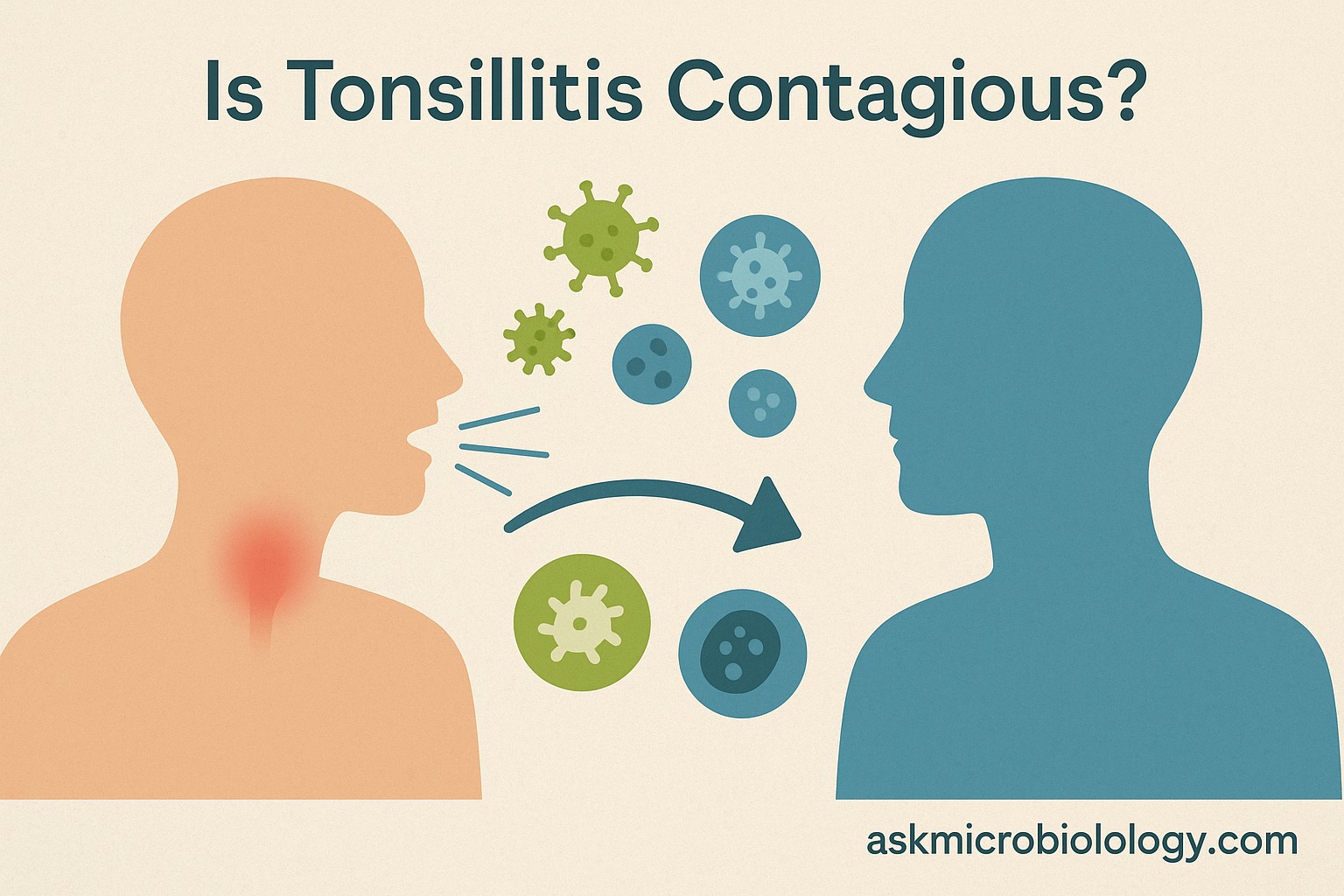You wake up with a painfully sore throat and notice your tonsils are swollen. A question immediately comes to mind – is it tonsillitis, and if so, is it contagious? This is a common worry for parents and anyone feeling under the weather with throat pain. Tonsillitis refers to inflammation of the tonsils (the two fleshy glands at the back of your throat) usually caused by an infection. The short answer is that tonsillitis itself isn’t “caught” like a cold, but the germs causing it definitely are contagious1,2. In other words, if you have tonsillitis due to a virus or bacteria, you can spread that virus or bacteria to others, potentially making them sick. Let’s break down what that means, the differences between viral and bacterial tonsillitis, how long someone with tonsillitis stays contagious, and ways to prevent passing it on.
Bacterial vs. Viral Tonsillitis: What’s the Difference?
When doctors say “tonsillitis,” they mean your tonsils are infected and inflamed. This infection can come from viruses or bacteria. In fact, viruses account for up to 70% of tonsillitis cases3 – often the same viruses that cause the common cold or flu. If you’ve ever had a bad cold with a sore throat, that could have been viral tonsillitis. Common culprits include adenoviruses, influenza, and Epstein-Barr virus (which causes mono)4,5. Viral tonsillitis tends to come with cold-like symptoms such as a runny nose or cough, on top of the throat pain.
On the other hand, bacterial tonsillitis makes up roughly 15% to 30% of cases6. The most frequent cause is group A Streptococcus bacteria – the same germ behind strep throat. In fact, when someone says “strep throat,” they’re talking about a type of bacterial tonsillitis caused by this Streptococcus infection. Bacterial tonsillitis (strep) often brings on a sudden, severe sore throat with high fever and swollen lymph nodes, and it’s less likely to include cough or congestion7,8. You might also see white or yellow patches of pus on the tonsils with bacterial infections8. Because the symptoms of viral and bacterial tonsillitis overlap so much, a doctor might do a rapid strep test – swabbing your throat – to see if bacteria are present9. This matters for treatment (antibiotics can treat strep throat but won’t help a virus) and for knowing how long you’ll be contagiou

s.
Who gets tonsillitis? It turns out mostly kids and teens. In the United States, most children come down with tonsillitis at least once, with cases peaking around 7 or 8 years of age10. That doesn’t mean adults are immune – anyone can get it – but tonsillitis is particularly common among school-age children who are constantly swapping germs in classrooms and daycare.
How Does Tonsillitis Spread?
Whether the infection is viral or bacterial, the germs that cause tonsillitis spread easily from person to person. If you’re around someone with tonsillitis and they cough or sneeze, you could breathe in tiny droplets that carry the infection11. Even talking closely or kissing can pass along those germs. Sharing utensils, cups, or food with an infected person is another surefire way to catch the culprit microbes12. Ever notice how if one child in a family gets strep throat, a sibling might get it next? That’s because of this close contact and sharing of items.
The germs can also land on surfaces – like doorknobs, phones, or toys – and live for a short time. If you touch that contaminated surface and then touch your mouth or nose, you could infect yourself. For example, a child with tonsillitis might wipe their runny nose, then touch a table; another child touches the same spot and later rubs their eyes or nose, introducing the virus or bacteria into their system. It sounds a bit gross, but it’s the reality of how these infections travel.
One important point: you don’t actually “catch” the inflamed tonsils. You catch the virus or bacteria, and it may cause tonsillitis in you. It’s possible for two people exposed to the same germs to have different reactions – one gets a mild cold, another gets full-blown infected tonsils. But generally, if someone in your household has infectious tonsillitis, assume the germs are contagious and take precautions.
How Long Is Tonsillitis Contagious?
If you do get infected, when are you in the clear to be around others? This depends on whether it’s viral or bacterial and if you receive treatment. Here’s what to know:
- Contagious Period Starts Early: You can actually spread the illness before you even know you’re sick. People with tonsillitis tend to be contagious about 1-2 days before symptoms show up13. So that day you felt fine but had unknowingly caught the virus/bacteria, you might already be shedding it. This is why tonsillitis and similar infections can sweep through classrooms – by the time one kid is obviously ill, others were exposed a day or two prior.
- Viral Tonsillitis: If a virus is causing your tonsillitis, you’re generally contagious as long as you have symptoms. Typically, a viral sore throat or tonsillitis lasts about a week or so and during that time you can pass it to others14. Most viral tonsillitis cases run their course in 5 to 7 days, though some can linger a bit longer15. You might start feeling better after a few days, but it’s wise to consider yourself contagious until you’re fully recovered (no fever, throat improving). Certain viruses, like the Epstein-Barr virus that causes mono, can actually be shed for a while even after you feel better16, though that’s a special case. In general, once your symptoms are gone, your body has likely cleared enough of the virus that you’re no longer a big risk to others.
- Bacterial Tonsillitis (Strep Throat): For untreated strep or other bacterial tonsillitis, you could remain contagious for about 2 weeks14. That’s right – untreated strep throat can potentially spread to others for up to a couple of weeks (or until your immune system finally clears it). However, there’s good news: once you start on the right antibiotics, you quickly become far less contagious. Doctors usually say that after 24 hours on antibiotics (and with no fever), you’re no longer contagious17,18. Antibiotics kill off the bacteria so effectively that after a day or two of treatment, the chance of spreading the infection drops dramatically. This is why, for example, if your child is diagnosed with strep throat, schools often ask that they stay home at least one full day after starting antibiotics.
So, to put it simply: if you have viral tonsillitis, you might be contagious for around a week (or for the duration of your cold/flu symptoms). If you have bacterial tonsillitis, you’re contagious until treated, but proper treatment shortens that to about a day after starting meds. In both cases, the worst shedding of germs happens when you’re feeling most sick (feverish, lots of throat pain), not so much after you’re recovering.
Remember that everyone is a bit different. Some people might fight off a virus faster, and some might carry strep bacteria in their throat without severe symptoms but could still spread it. There are even rare “carrier” situations – for instance, someone who had strep throat and feels better might still harbor low levels of the bacteria for a while. They might not be very contagious, but it’s not zero risk. These are exceptions, though. For practical purposes, use the guidelines above.
When to resume school or work: If you or your child has tonsillitis, a good rule is to stay home until fever-free and feeling substantially better. If it was bacterial and antibiotics were prescribed, wait at least 24 hours (and again, no fever) before going back to work, school, or daycare[19]. Not only does this protect others, it also gives your body time to rest and heal.

Prevention: How to Avoid Spreading or Catching Tonsillitis
By now it’s clear that tonsillitis-causing germs spread pretty easily. The silver lining is that basic hygiene can go a long way in preventing transmission. You’ve probably heard these tips before, but they truly help:
- Wash your hands frequently: Thorough handwashing with soap and water is one of the best defenses against all sorts of infections. If you’ve been around someone sick, or you’re the one sick, wash hands often – especially after coughing or sneezing and before eating or touching your face20,21. Kids should be taught to scrub their hands regularly too, since they are prone to touching everything and then their face.
- Cover coughs and sneezes: If you have tonsillitis and need to cough or sneeze, do it into your elbow or a tissue (and then toss the tissue)22. This prevents a spray of droplets. Likewise, teach children to cough into their sleeve. It’s an easy habit that can keep germs off of shared surfaces.
- Don’t share utensils, cups, or toothbrushes: During the contagious period, use your own glass and utensils and don’t let others accidentally use them23. For parents, this means avoiding tasting your toddler’s food with their spoon, for example, if they have tonsillitis. And definitely avoid kissing on the lips until better – it’s a quick way to swap saliva germs.
- Clean commonly touched surfaces: Wipe down doorknobs, light switches, keyboards, kids’ toys – anything lots of hands touch – with disinfectant if someone in the house is ill23. Germs can survive on surfaces for a little while, so cleaning can cut down the risk of someone else picking them up.
- Keep your distance (temporarily): It’s tough, but try to minimize very close contact like hugging and cuddling while someone is acutely sick. If you’re the sick one, it might mean skipping social events for a few days. If it’s your child who’s sick, you don’t need to isolate them completely, but perhaps avoid unnecessary playdates until they’re improving. Definitely keep them home from school or daycare until they’re not contagious.
- Consider masks: In situations where you must be around others while having symptoms, wearing a mask can help catch respiratory droplets. This is more of a consideration for teens and adults; young kids might not tolerate masks well, but for an adult with, say, a lingering cough from viral tonsillitis, a mask in public could add a layer of protection for those around you.
- Healthy habits: In a broader sense, keep your immune system strong with good nutrition, rest, and avoiding smoking or secondhand smoke. Smoking can irritate the throat and may increase susceptibility to infections24. While healthy habits won’t guarantee you won’t get sick, they improve your body’s defenses.
Finally, note that if you know someone has strep throat or a bad viral infection, use caution. It’s not rude to politely avoid close contact until they’re better. Most people understand – they don’t want to get you sick either.
Final Thoughts
Tonsillitis can be a real pain (literally!), but the good news is that it’s usually a mild, short-lived illness. Most cases, especially viral ones, will improve within a week with rest and home care15. Bacterial cases like strep throat start feeling better quickly once antibiotics kick in. The key points to remember are that the infections causing tonsillitis are contagious, so you should take steps to protect others if you’re ill (and protect yourself if someone around you is ill). Stay mindful of hygiene and give yourself time to recover before rushing back to work or school. If you’re ever unsure whether your tonsillitis is contagious or how long to isolate, don’t hesitate to call your doctor – especially if symptoms are severe or not improving. With some common-sense precautions, you can care for yourself or your child without sharing the unwanted “gift” of infection with everyone around you.
References:
- Granville Health System ENT. Understanding Tonsillitis – Is Tonsillitis Contagious? (2024) – Explains that tonsillitis itself isn’t inherently contagious, but the viruses and bacteria causing it are, and outlines how long to stay contagious for viral vs bacterial cases[1][25].
- Verywell Health. Is Tonsillitis Contagious, and How Does It Spread? (Madormo, C., Updated Sept 17, 2024) – Notes that up to 70% of tonsillitis cases are viral and 15-30% are bacterial (strep), and that the germs spread via coughing, sneezing, or sharing utensils[2][3].
- Is Tonsillitis Contagious? (Davis, C.P., MD, et al., Medically reviewed Jun 28, 2024) – Provides typical contagious periods: about 7-10 days for viral tonsillitis, up to 2 weeks for bacterial (if untreated), and 24-48 hours after antibiotics for strep[26][17].
- Is Tonsillitis Contagious? What You Should Know (J. Seladi-Schulman, PhD, medically reviewed by K. Gill, MD, 2018) – Emphasizes staying home until symptoms resolve, and that after 24 hours of antibiotics a person with bacterial tonsillitis is usually not contagious[19].
- American Family Care. Strep Throat vs. Tonsillitis: How to Tell the Difference & How to Treat It – Describes symptom differences: strep causes sudden severe throat pain, fever, swollen nodes, and sometimes white patches or rash, whereas tonsillitis (often viral) can include cough, runny nose, and hoarse voice[27][28].
- FirstResponse Healthcare. Strep Throat vs. Tonsillitis – Key Differences (Medically reviewed Sept 18, 2024) – Explains that strep throat is a specific bacterial infection (Group A Strep causing ~30% of tonsillitis cases) and most other tonsillitis cases are viral[29][5].
- How do you know if tonsillitis is viral or bacterial? – Highlights that viral infections often present with cough and congestion, while bacterial (strep) causes high fever, intense sore throat, swollen lymph nodes, and pus on tonsils[7][8].

